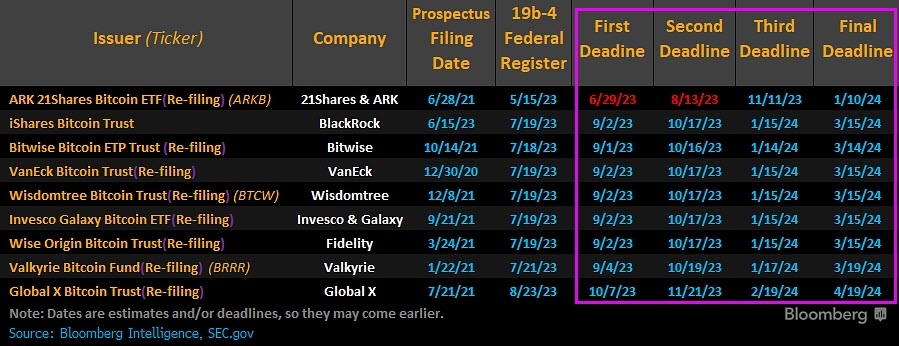The Securities and Exchange Commission (SEC) was the hot topic in June, and the situation remained the same in July and August. The future of SEC and cryptocurrency still depends on its stubbornness. Every month, the market experiences fluctuations with important news related to SEC. The stock market lawsuits in June, the XRP Coin summary decision in July, and Grayscale’s victory in August all had serious consequences on prices.
Spot Bitcoin ETF
In October 2021, we witnessed the excitement in the markets when the US Securities and Exchange Commission (SEC) first approved a Bitcoin-related Futures ETF. It was an exciting development that increased expectations for the approval of a spot Bitcoin ETF. After Grayscale’s recent legal victory against SEC’s review of the spot Bitcoin ETF proposal, this hope has further increased.
To understand the SEC chairman’s negative attitude, we need to look at the results of the ETF approvals. Gensler is known for his positive attitude towards Bitcoin and his 2018 MIT lectures. The SEC chairman, who believes that cryptocurrencies pose serious fraud risks for US investors, may not want to make a decision in favor of the markets and increase the risk. If BTC and the cryptocurrency markets were completely independent of each other, Gensler might have been less concerned about approval.
Spot Bitcoin ETF Applications
BlackRock, the world’s largest asset manager with over 8 trillion dollars in assets under management, pushed the cryptocurrency markets to a significant turning point with its decision. BlackRock is the largest company that can launch a product related to cryptocurrencies. As a lending giant to governments, BlackRock officially applied in June and joined the queue for ETF approval.
On June 15, the institution that applied for a spot Bitcoin ETF, with Coinbase as the crypto custodian and spot market data provider, and BNY Mellon as the cash custodian, must see a future in this market. The company’s CEO, Larry Fink, had previously referred to BTC as a money laundering index. He needs to see a wave of corporate demand coming to change his mind.
I won’t go into details about BlackRock and Bitcoin rumors because we have already addressed them enough and exposed their nonsense.
WisdomTree, a New York-based asset management firm, first applied for a spot Bitcoin ETF in the US on December 8, 2021, and this application was rejected by the SEC in 2022. The agency claimed that the ETF was inadequate in terms of investor protection; however, after BlackRock entered the race for a spot Bitcoin ETF, WisdomTree reapplied to the SEC on July 19.
Valkyrie, an asset management firm, made its first spot Bitcoin ETF application in January 2021, but like many other asset managers, it was rejected by the SEC. However, on June 21, it re-submitted its application. As you can see, the resubmissions coincide with BlackRock’s entry. The asset management giant has definitely encouraged others.
ARK Invest, VanEck, Fidelity/Wise Origin, Invesco Galaxy, Bitwise, and GlobalX are the other ETF applicants in line.
When Will the Spot Bitcoin ETF Be Approved?
In light of Grayscale’s recent legal victory and the wave of renewed applications, ETF analysts at Bloomberg have increased the expected approval chances for a spot Bitcoin ETF from 65% to 75%. As expected, the SEC has postponed its decision on all seven applicants. Analysts predicted that as the deadlines approached (listed below), the SEC might not make a decision on an ETF until early 2024.

Why Doesn’t the SEC Approve?
SEC, which previously rejected VanEck’s spot Bitcoin ETF, claimed that the Bitcoin market is not big or mature enough to sustain the demand for an ETF. The commission also stated that price volatility and insufficient trade surveillance levels could make the market susceptible to fraud and manipulation.
Bitfinex Alpha analyst stated that one of the vital concerns behind the rejection of spot Bitcoin ETFs is the regulator’s ability to monitor and continuously ensure the security and oversight of assets. However, for this to happen, the US needs more regulatory and legal infrastructure before “SEC or other relevant parties allow an ETF provider to handle this job” without being cautious.
“Otherwise, the entire purpose of an ETF (to bypass dealing with digital asset wallets or crypto exchanges) would be defeated. Therefore, it would not be correct to say that spot Bitcoin ETFs do not create manipulation concerns in the eyes of the SEC. The non-approval of the ProShares Bitcoin ETF in 2018 clarifies this point. Another concern related to the literature of the document was the ability of the Bitcoin market to handle the volume that a spot ETF would bring.”

 Türkçe
Türkçe Español
Español










